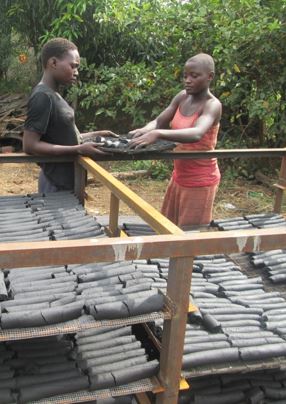Briquette Producer in Uganda Creates Livelihood Opportunities for Women
Supporting locally-run, woman-led businesses is a key element of the Alliance’s gender strategy to increase the role of women in the sector and to address gender issues to scale adoption. Through the Women’s Empowerment Fund (WEF), the Alliance works with small and medium enterprises that are run by women, such as Appropriate Energy Saving Technologies (AEST) in Eastern Uganda. AEST creates livelihood opportunities for women in the cookstove and fuel value chain by scaling women’s participation as suppliers of agricultural waste, producers of charcoal briquettes, and as distributors and after-sales service providers for these products. AEST has an added focus on increasing women’s economic empowerment through agency-based empowerment and leadership training for women employees, as well as engaging men as agents of change within the community.
Increasing women’s participation and empowerment in the cookstove & fuel value chain

AEST’s WEF project also aims to increase the number of men in communities that support women’s livelihoods and income-generating activities. To achieve this, AEST conducted four community dialogue meetings with 61 men and 108 women in two districts (Kumi and Soroti). This has greatly strengthened the collaboration and joint efforts by both men and women to work towards solving community problems together, particularly the issue of fuel scarcity. Dialogues amongst the community members helped raised awareness about the importance of women’s participation in the workplace, and men reported that they would be supportive of their wives or partners by providing them with startup capital for business activities or childcare to help foster a better environment for women’s entrepreneurship.
[pullquote]
The community dialogue meetings also benefitted AEST by motivating community members to partner with their company to ensure quick adoption of clean cooking solutions. Those with existing businesses saw cookstoves as a way to expand their reach, and others saw this as an opportunity to start new entrepreneurial activities. AEST will continue to engage women as a core component of its initiatives, ultimately enhancing business effectiveness, sustainability, and the ability to have a lasting social impact at the community level.
